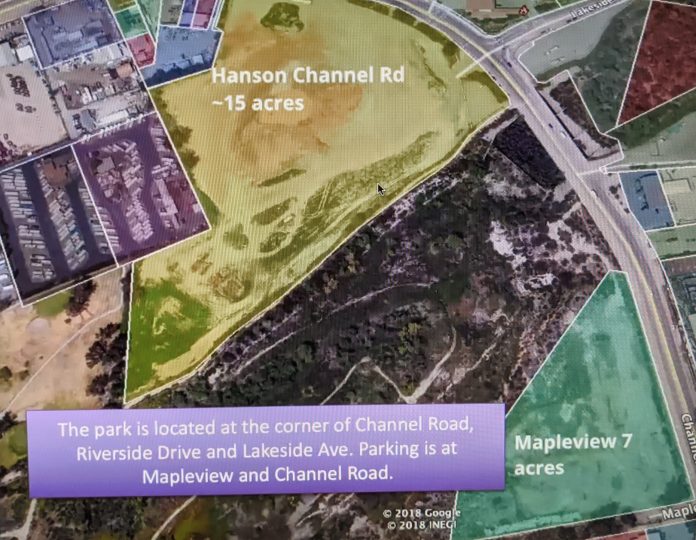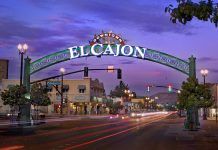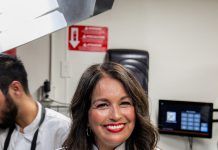Lakeside’s River Park Conservancy Executive Director Robin Rierdan gave a presentation at the Lakeside Community Collaborative on June 28 to talk about its upcoming park idea with 15-acres that have been donated to the Conservancy by Hanson Aggregates-Heidelberg Cement Corporation. A deal, 20 years in the making. When the park was just being considered in 1999, Hanson Aggregate said they would donate nearly 15-acres at the corner of Channel Road and Lakeside Avenue, valued at nearly $15 million.
Having family in Switzerland, and knowing they would be getting this land, Rierdan said she travelled through Switzerland, Germany and New Zealand, looking for unique and interactive park attractions. She said ideas for the park had to promote things that are dynamic, variable, manipulative, changeable, imaginative, and cooperative. She said for people to think about “big ideas, things never done, and things that kids need.
“Right now, we need to crack open up our heads and think about what is fun, what do kids need, families need, and how we approach that,” she said.
The Conservancy is a non-profit, so it gets no federal funding and relies on grants and donations to make the park work and keep its continuity. Many of the amenities at the park will have a charge to participate in helping the Conservancy maintain and add to the park.
Rierdan showed slides of photos that she had taken from parks in her travels, and parks researched in California to demonstrate the types of things that would make the park a different type of destination for families.
Rierdan said the park will be as car free as possible with a main parking lot away from the park and a few handicapped parking spaces within the park area. It would be a single-entrance park.
Rierdan brought forth many ideas that would make the park a place for the entire family, create interactive play areas, and have amenities for people of all ages. She said some ideas are having a café or restaurant onsite, popup food stations, portable restrooms. Many of the ideas so far are in conjunction with working with other organizations in the community to facilitate art in the park, art exhibits, culinary schools, and working with the Lakeside Union School District to get ideas from students and teachers in the area that would make the park not only a fun place for kids to play, but also to learn. She said it is important that the destination be a place where people do not have to bring all their own necessities, like when taking a trip to another park or the beaches. She said she would like to follow some of the models of parks in Switzerland that all have a place to eat, water activities, and sand.
“Include a restaurant where parents can see their kids play while enjoying,” she said. “Mom and dad to not have to hover. They can sit, watch their kids, have a glass of wine and some cheese, and everyone has a great time. This $8.5 million grant is a park, with a café for moms and dads, healthy food, and play areas for different age groups. It would be fenced. There would be a gate so when you come in with your child, you are the only ones in there. If you do not have a kid, you have no reason to be there. It would be fenced in a way that when you leave, you must match up your wrist bracelets that says this is your kid and you can leave. You do not have to worry about someone coming in and snitching your kids.’
Rierdan said most amenities in parks that are static are not good ideas because once kids have done it once, they are done with it. Many ideas she brought to the conversation were zip lines, separate pools designed for all ages, natural pools that are self-cleaning without chlorine, and can be changed when it is cold to a skate park, basketball court or other physical activity. She said that pool designed with sand, and not concrete, are better destinations for the family.
“Kids love swings, they can manipulate it, they control it,” she said. “Water features that have interactive abilities. Turning a wheel to make the water, paddling to make the water, so if you want water, you must have someone to make the water go. Everyone must work together to get something started and to have fun.”
Rierdan showed safer versions of merry go rounds, permanent ping pong tables, different styles of tall climbing net structures, interactive places where kids can manipulate water, sand and mud, giving kids the ability to create and learn. She said it is necessary to have activities for young, middle and teens.
“This is where parks are going now in Switzerland,” she said. “They understand that children that are 8-12 need to make things. They need to cut things up, design things, they need to explore, learn their own talents and skills and trust them. We want to do this as well, where kids get to cut, saw, build things they want to build.”
Rierdan said it wants to install fire pits.
“Fire is an ancient calling that brings communities together. It is a way to bring your family, your tribe, your group together,” she said.
Other amenities she discussed included paly gardens for children of all ages.
“Kids at different ages have a developmental need to play,” she said. “They are always learning something, and play is the way they learn to work amongst their peers, trust their ideas, learn how to succeed, how to fail, pick themselves up, try again, without an adult looking over their shoulder.”
She said in an age appropriate play garden, you have water, digging, off the ground construction, art, imagination and cooperation. “All those things need to be designed into it,” she said.
Rierdan emphasized the need for activities surrounding water, sand and mud.
“We are looking at having a bunch of hand pumps where they can pump water into whatever they are doing,” she said. “Kids work together, they are making something interesting and fun, and they are enjoying themselves. Mud is another way of moving things around. Making dams, moving water around and creating things. A poling puddle, basically a big pond and kids have rafts and poles and pole themselves around the pond. I would personally like to add water cannons and designed that when it is too cold it would become a basketball court.”
Other amenities that would help generate revenue for the park include an amphitheater, a wedding venue, and she said the Conservancy is working with Grossmont College about having its culinary program run a facility that would serve the public and help with social events.
Rierdan said art is important in the development of kids. She showed an exhibition hall where all the walls and lighting could be moved around to facilitate almost any type of art exhibit. She said art in the park is just as important.
“Borrow or rent exhibits ins storage from other museums,” she said. “Interactive areas for older kids to build, and paint. Get art from Burning Man and other places to display in the park and help them sell the art when it is complete. Why not have our own arts in the park, get these things from Burning Man, keep them for a year, then give them back to the artists and help them sell it? San Diego Consortium of Artists do art installations, and they are extremely interested in figuring out a way to work with our community doing community-based art installations at this park.”
Rierdan said the office is right outside of the Los Coches Creek, and they have urban artists coming in there all the time.
“They will never talk to us,” she said. “They are so afraid. And we admire their work. We need a place to decriminalize our artistic children. When you have an artist’s brain, you sometimes cannot help yourself. You are doodling on your papers, your desks and we need a place where the community can come and enjoy their art, where it is safe, and been juried a little bit.”
Being on Kumeyaay land, many suggested that the Conservancy work with the Kumeyaay Nation in bringing Kumeyaay arts, activities and cultural events into the park. One suggested building Kumeyaay ewaa shelters on the park that would be available for people to rent out.
A few members expressed concerns about having alcohol onsite while playing with children, the height of climbing structures that are being used in other countries, and fire pits being used in a region known for wildfires.
Contact Robin Rierdan at robin@lakesideriverpark.org to submit ideas for the park. Visit www.lakesideriverpark.org for more information.














